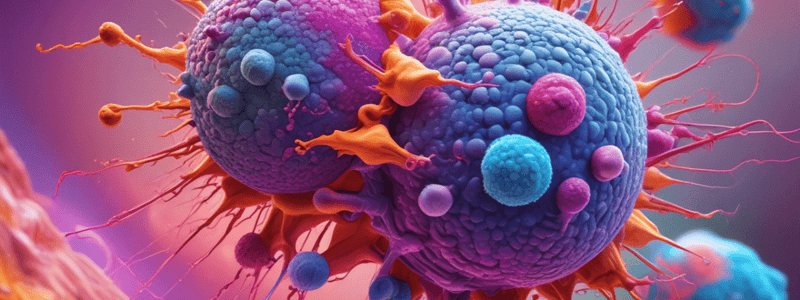Podcast
Questions and Answers
In tissue rejection, which route involves donor dendritic cells directly presenting antigens to recipient T cells?
In tissue rejection, which route involves donor dendritic cells directly presenting antigens to recipient T cells?
- Lymph Node Response
- Recipient APC Route
- Direct Route (correct)
- Indirect Route
Which type of MHC molecules are most frequently recognized by alloantibodies generated from alloreactive B cells?
Which type of MHC molecules are most frequently recognized by alloantibodies generated from alloreactive B cells?
- Class I MHC
- Class II MHC (correct)
- Class III MHC
- Class IV MHC
What is the prime target of graft vasculature in tissue rejection?
What is the prime target of graft vasculature in tissue rejection?
- Endothelial cells (correct)
- Smooth muscle cells
- Epithelial cells
- Fibroblasts
Which cells capture and process donor alloantigens and then present them to recipient T cells in the indirect pathway of tissue rejection?
Which cells capture and process donor alloantigens and then present them to recipient T cells in the indirect pathway of tissue rejection?
What is the key function of alloreactive antibodies in tissue rejection?
What is the key function of alloreactive antibodies in tissue rejection?
Where do antigens presented by both donor and recipient APCs travel to in the rejection process?
Where do antigens presented by both donor and recipient APCs travel to in the rejection process?
Which molecule expressed by endothelial cells serves as a target for graft vasculature in tissue rejection?
Which molecule expressed by endothelial cells serves as a target for graft vasculature in tissue rejection?
What is the consequence of alloantibodies recognizing graft antigens in tissue rejection?
What is the consequence of alloantibodies recognizing graft antigens in tissue rejection?
What is the primary role of CD8+ cytotoxic T cells in transplant rejection?
What is the primary role of CD8+ cytotoxic T cells in transplant rejection?
How do CD4+ helper T cells contribute to tissue rejection in transplants?
How do CD4+ helper T cells contribute to tissue rejection in transplants?
What is the role of alloreactive B cells in response to alloantigens?
What is the role of alloreactive B cells in response to alloantigens?
Which immune cells are responsible for directly attacking and killing graft tissue cells?
Which immune cells are responsible for directly attacking and killing graft tissue cells?
How do alloantigen-specific antibodies contribute to tissue rejection?
How do alloantigen-specific antibodies contribute to tissue rejection?
Which component is a prime target for the recipient's immune response in transplant rejection?
Which component is a prime target for the recipient's immune response in transplant rejection?
What is the ultimate consequence of an attack on the vasculature of transplanted tissue?
What is the ultimate consequence of an attack on the vasculature of transplanted tissue?
What effect do antibodies targeting MHC proteins have on the donated tissue?
What effect do antibodies targeting MHC proteins have on the donated tissue?
What is the main way activated effector T cells contribute to transplant rejection?
What is the main way activated effector T cells contribute to transplant rejection?
Which pathway involves the recipient dendritic cells capturing and processing donor alloantigens in tissue rejection?
Which pathway involves the recipient dendritic cells capturing and processing donor alloantigens in tissue rejection?
What is the primary function of effector T cells in transplant rejection?
What is the primary function of effector T cells in transplant rejection?
Which immune cells are primarily involved in the differentiation into effector T cells after antigen presentation in the lymph node response?
Which immune cells are primarily involved in the differentiation into effector T cells after antigen presentation in the lymph node response?
In transplant rejection, what is the direct consequence of donor dendritic cells directly presenting antigens to recipient T cells?
In transplant rejection, what is the direct consequence of donor dendritic cells directly presenting antigens to recipient T cells?
What is the crucial function of recipient APCs in the indirect pathway of tissue rejection?
What is the crucial function of recipient APCs in the indirect pathway of tissue rejection?
What is a significant outcome of antigens being presented to naive T cells in the lymph nodes during tissue rejection?
What is a significant outcome of antigens being presented to naive T cells in the lymph nodes during tissue rejection?
How do effector T cells contribute differently from naive T cells to tissue rejection?
How do effector T cells contribute differently from naive T cells to tissue rejection?
What role do CD4+ helper T cells play in transplant rejection?
What role do CD4+ helper T cells play in transplant rejection?
Which effector mechanisms can separately or in combination promote allograft rejection?
Which effector mechanisms can separately or in combination promote allograft rejection?
What is the primary function of alloreactive B cells in response to alloantigens?
What is the primary function of alloreactive B cells in response to alloantigens?
What is the consequence of an attack on the vasculature of transplanted tissue?
What is the consequence of an attack on the vasculature of transplanted tissue?
Which component plays a crucial role in orchestrating an immune response against transplanted tissue?
Which component plays a crucial role in orchestrating an immune response against transplanted tissue?
What is the role of CD8+ cytotoxic T cells in allograft rejection?
What is the role of CD8+ cytotoxic T cells in allograft rejection?
How do antibodies produced by alloreactive B cells contribute to tissue rejection?
How do antibodies produced by alloreactive B cells contribute to tissue rejection?
In transplant rejection, what is a prime target for the recipient's immune response?
In transplant rejection, what is a prime target for the recipient's immune response?
What is crucial for developing strategies to prevent or mitigate rejection and improve transplant outcomes?
What is crucial for developing strategies to prevent or mitigate rejection and improve transplant outcomes?

